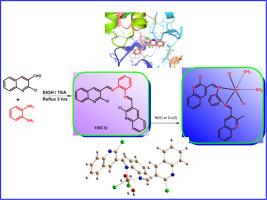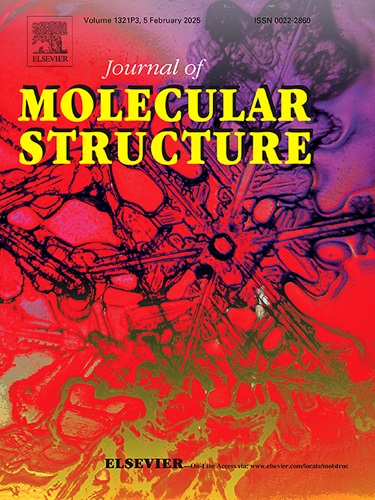Design, characterization, and bioactivity evaluation of novel symmetrical N,N'-benzene-1,2-diylbis[1-(2-chloroquinolin-3-yl)methanimine] based metal complexes
IF 4
2区 化学
Q2 CHEMISTRY, PHYSICAL
引用次数: 0
Abstract
This study presents the synthesis and characterization of two novel metal complexes derived from the symmetrical Schiff base N,N'-benzene-1,2-diylbis[1-(2-chloroquinolin-3-yl)methanimine] (OBCQ), coordinated with Nickel(II) (NiOBCQ) and Copper(II) (CuOBCQ). The structural elucidation of these complexes was achieved through a comprehensive suite of analytical techniques, including elemental analysis, UV–visible spectroscopy, mass spectrometry, infrared spectroscopy, magnetic susceptibility, conductivity measurements, and thermal analysis. The data confirm that both NiOBCQ and CuOBCQ adopt octahedral geometries, formulated as [Ni(OBCQ)(H₂O)₂(Cl)₂] and [Cu(OBCQ)(H₂O)₂(Cl)₂], respectively. Density Functional Theory (DFT) calculations were employed to validate the molecular structures and explore the quantum chemical parameters of OBCQ and its metal complexes. Additionally, in vitro assessments of anti-inflammatory and antioxidant activities revealed enhanced bioactivity for the metal complexes compared to the free OBCQ ligand. Molecular docking studies against key proteins (5IKT for Human Cyclooxygenase-2 and 5IJT for Human Peroxiredoxin 2) highlighted strong binding affinities and molecular interactions, suggesting that OBCQ and its metal complexes hold significant promise as novel therapeutic agents with multifaceted biological activities.

新型对称 N,N'-苯-1,2-二基双[1-(2-氯喹啉-3-基)甲亚胺]金属配合物的设计、表征和生物活性评估
本研究介绍了由对称席夫碱 N,N'-苯-1,2-二基双[1-(2-氯喹啉-3-基)甲亚胺](OBCQ)衍生的两种新型金属配合物的合成和表征,这些配合物分别与镍(II) (NiOBCQ) 和铜(II) (CuOBCQ)配位。通过一整套分析技术,包括元素分析、紫外-可见光谱、质谱、红外光谱、磁感应强度、电导率测量和热分析,这些配合物的结构得以阐明。数据证实 NiOBCQ 和 CuOBCQ 都采用八面体几何结构,分别表述为 [Ni(OBCQ)(H₂O)₂(Cl)₂] 和 [Cu(OBCQ)(H₂O)₂(Cl)₂]。通过密度泛函理论(DFT)计算,验证了 OBCQ 及其金属配合物的分子结构,并探索了其量子化学参数。此外,体外抗炎和抗氧化活性评估显示,与游离 OBCQ 配体相比,金属复合物的生物活性更强。与关键蛋白(5ICT 与人环氧合酶-2 和 5IJT 与人过氧化还原酶-2)的分子对接研究突显了很强的结合亲和力和分子相互作用,表明 OBCQ 及其金属复合物有望成为具有多方面生物活性的新型治疗剂。
本文章由计算机程序翻译,如有差异,请以英文原文为准。
求助全文
约1分钟内获得全文
求助全文
来源期刊

Journal of Molecular Structure
化学-物理化学
CiteScore
7.10
自引率
15.80%
发文量
2384
审稿时长
45 days
期刊介绍:
The Journal of Molecular Structure is dedicated to the publication of full-length articles and review papers, providing important new structural information on all types of chemical species including:
• Stable and unstable molecules in all types of environments (vapour, molecular beam, liquid, solution, liquid crystal, solid state, matrix-isolated, surface-absorbed etc.)
• Chemical intermediates
• Molecules in excited states
• Biological molecules
• Polymers.
The methods used may include any combination of spectroscopic and non-spectroscopic techniques, for example:
• Infrared spectroscopy (mid, far, near)
• Raman spectroscopy and non-linear Raman methods (CARS, etc.)
• Electronic absorption spectroscopy
• Optical rotatory dispersion and circular dichroism
• Fluorescence and phosphorescence techniques
• Electron spectroscopies (PES, XPS), EXAFS, etc.
• Microwave spectroscopy
• Electron diffraction
• NMR and ESR spectroscopies
• Mössbauer spectroscopy
• X-ray crystallography
• Charge Density Analyses
• Computational Studies (supplementing experimental methods)
We encourage publications combining theoretical and experimental approaches. The structural insights gained by the studies should be correlated with the properties, activity and/ or reactivity of the molecule under investigation and the relevance of this molecule and its implications should be discussed.
 求助内容:
求助内容: 应助结果提醒方式:
应助结果提醒方式:


